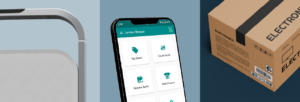RFID has redefined how companies do business. RFID has branched out from the retail sector and has moved onto more diverse use cases, from keeping track of food waste in restaurants to even healthcare in preventing counterfeit drugs ending up on the market.
RFID, or Radio Frequency Identification, utilizes technology that stores data, such as item specification of color, size, type, etc. Most commonly, RFID comes in the form of labels that can be applied at source to different items. If a product is not tagged at source, a company can have this product tagged at the DC or, if applicable, in store. By tagging all product with an RFID label, businesses have the visibility they need on their inventory, allowing for faster inventory management, accurate restocking, and faster and better customer service.
This technology can help employees take stock counts quickly and efficiently, allowing businesses to know if they need to replenish, reorder, or they have overstock.
RFID can also assist in those cases where companies have items with expiration dates. When companies take stock, their inventory management software will alert them of items near their expiration date and helps localize them so that they can be moved up to the front or discounted, to decrease waste.
Managing inventory using RFID technology allows employees to better help their customers as they know exactly what is in stock and can help them find what they are looking for more efficiently.

In the retail space, RFID enabled self-checkouts allow for a much smoother and faster experience. Customers only need to drop their purchases in the checkout basket, which will be scanned instantaneously, and shown as a list on the checkout screen so customers can approve and pay. This transaction only takes seconds, improving the consumer shopping experience.
According to the National Retail Security Survey from 2022[1], 38.6% of retailers are implementing or planning to implement RFID systems for their loss prevention initiatives. Applying RFID to your loss prevention initiatives allows you to have visibility of your merchandise every step of the way. Retailers can follow the product in each step of the supply chain, from factory to warehouse, making sure the product makes it safely to its destination.
With RFID as EAS, retailers can know what specific items are being stolen with the help of RFID enabled antennas at Point of Exit. This visibility allows them to identify high-shrink products in their store, create a better plan for protecting their merchandise, keep inventory accurate and increase sales.
RFID allows businesses to optimize their day to day, creating efficient processes that can lead to better time management and allow store associates to focus on customer service.
Checkpoint Systems is one of the only companies that owns every stage of your RFID journey. With over 20 years of experience with RFID, our focus is on our clients' needs, making us more responsive, adaptable, and able to offer a more complete service. We are ARC Quality certified as well as part of the RAIN Alliance. Our extensive portfolio of solutions can help businesses satisfy their inventory control and asset protection needs.
For more information about how Checkpoint Systems’ can implement RFID solutions for your business please get in touch.
[1] National Retail Security Survey Organized Retail Crime 2022.pdf (nrf.com)
